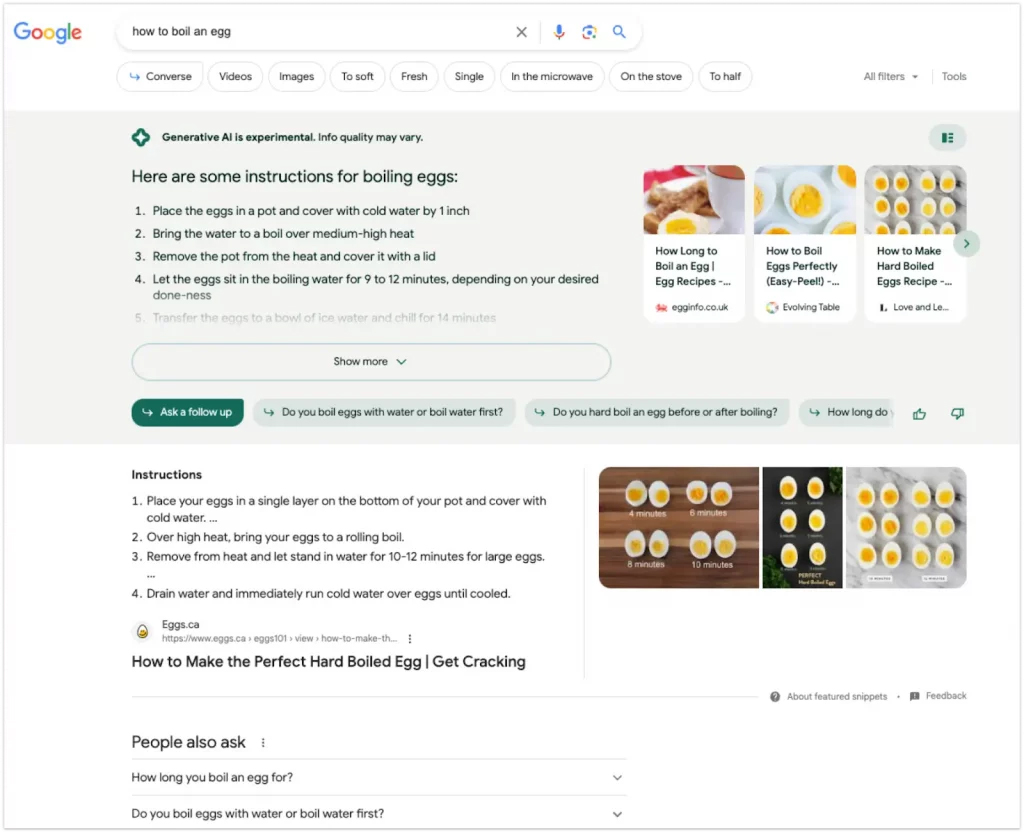Optimizing websites in the era of AI-powered search
How can you optimize your website to take advantage of new AI-powered search engines? This article explores the rise of Generative Engine Optimization and provides tips for creating website content that appeals to AI algorithms.

For nearly three decades now, Search Engine Optimization (SEO) has remained the cornerstone practice for improving website visibility and ranking in search engine results pages. By optimizing for search engines like Google, businesses have made their websites visible to the world, driving significant traffic to their sites.
However, the recent rise of AI-powered search engines, such as Google AI Overviews and Bing Generative Search, alongside generative AI programs like Chat GPT and Google Gemini, ushers in a new era of SEO. This new era combines traditional SEO practices with a new discipline centered around AI-driven search, known as Generative Engine Optimization.
The growth of AI-powered search engines
The use of AI-powered search is increasing, with roughly 13 million adults in the United States claiming to have used generative AI programs in 2023 as their primary tool for online search. By 2027, this number is expected to rise to 90 million. A late-2023 report from Gartner predicted that 79% of US consumers would likely try AI-powered search during 2024 (as of January 2025, no data exists on actual usage yet).
All this to say that AI-powered search algorithms are unlikely to be going away anytime soon, and their adoption in different forms will likely continue to rise.

Generative Engine Optimization – From keywords to semantics
Generative Engine Optimization (GEO) is the process of optimizing your website's content to boost its visibility in AI-driven search engines, not simply search result pages. As opposed to traditional SEO, which primarily targets human search behavior through keyword optimization, GEO focuses on crafting content that directly appeals to AI algorithms.
Put simply, AI algorithms seek to create accurate results by utilizing semantic search to understand natural language the way a human would. Semantic search includes understanding the context, meaning, and intent behind the words used in a search query. This approach allows AI algorithms to deliver more relevant results, aligning closely with the user’s actual needs.
From an SEO perspective, this means prioritizing content that is rich in context, aligned with user intent, and provides meaningful information rather than just focusing on specific keywords.
Tips for creating website content for AI-powered search engines
-
Create hierarchical content structures with clear topic boundaries
Organize your content in a clear, structured way, with distinct sections for each topic. Creating clear, structured content with distinct sections for each topic helps AI algorithms understand the context and intent of your content.
-
Answer questions - Prioritize natural, conversational language
When creating content for AI visibility optimization, use natural and conversational language that closely matches how users speak and ask questions to AI platforms. This may include incorporating more Q&A style formats. For example, instead of writing in formal, keyword-stuffed sentences, focus on creating content that flows naturally, and answers specific questions users might ask.
-
Focus on factual accuracy
AI-driven search engines always prioritize accurate and reliable information. This focus drives the enhancement of their AI models, making them increasingly accurate and reducing the likelihood of generating errors or misleading results (referred to as “AI hallucinations”). Given this, it’s worth double checking the accuracy of your content before publishing. If you don’t, rest assured AI engines will, and they’ll rank you accordingly.
-
Continue to leverage structured data markup
Slightly more on the technical side, implementing structured data markup (also known as schema markup) on your website helps AI engines better understand and categorize your content by providing explicit clues about the meaning of a page. This can lead to getting your content getting featured in rich snippets, knowledge panels, and other enhanced search results that can boost your visibility in AI-powered search engines.
This classic SEO tool remains just as important as it has been for decades. Be sure to use it.
Does Google penalize AI generated website content?
Google and other search engines do not inherently penalize AI-generated content. However, Google does penalize content that is deemed spammy, low-quality, or auto-generated without adding value to the end user. This means that if AI-generated content lacks originality, is keyword-stuffed, or is created mainly to manipulate search rankings, it could be penalized.
So feel free to use generative AI programs such as ChatGPT or Copilot to help your create content for your website. Just make sure to humanize the text and adapt it to be consistent with your brand’s tone of voice.
An introduction to AI Overviews
Likely the most prominent example of AI-powered search engines is Google’s AI Overviews (Formerly known as “Search Generative Experience”), which appears front and center on Google search queries. The feature was made available to everyone in the US on 14 May 2024, and has since rolled out to ~120 countries (it has yet to launch in the EU.)
Google AI Overviews is essentially Google’s upgraded search results page. Unlike traditional Google page results, AI Overviews uses generative AI in search to give users quick and clear overviews of their search queries, so they don’t have to click on individual website links.
In February 2023, Microsoft was in fact the first to release its own AI-powered search engine, which it integrated directly into its search engine Microsoft Bing. Over time, this technology evolved and is now known as Bing with AI Copilot.
Yes, AI-powered search may reduce your website traffic
As you may expect, AI Overviews and other AI-powered search engines can result in reduced organic search traffic for many websites. This is because they can often prioritize content from a single source and seek to minimize website links. There is real concern that their use could significantly increase the number of “zero-click” queries, where users no longer need to visit many websites.
Similarly, there are concerns that the widescale use of AI-powered search engines will result in a “winner-takes-all” scenario, where a single brand or business receives the vast majority of traffic due to its prominent position in the search engine results page (SERP).
In fact, the above mentioned report by Gartner predicted that increases in AI-powered search could reduce brand’s organic website search traffic (traffic that comes through search engines like Google) by a whopping 50% or more by 2028.
However, it’s important not to get ahead of ourselves. A general lack of usage data and the exploratory stage of these AI-powered search engines means the impact of AI-powered search on website traffic still remains largely uncertain.
Why search intent matters
What is more certain, however, is how different user search intent can impact general website search traffic.
Simple informational queries, such as “What is the population of England”, result in higher amounts of zero-click queries, as users are directly presented with the information and don’t require any additional action (although note, Google has been using a simpler form of natural-language processing to provide direct answers for quite a few years.)
On the other hand, queries which have more transactional intents (e.g., “buy new laptop”) or navigational intents (e.g., “Facebook login”) will still likely continue to generate substantial organic traffic to websites. Both types of queries are crucial for businesses. Transactional queries often lead to immediate conversions (like sales), while navigational queries help users quickly access known resources or brands, contributing to website engagement and traffic.
AI-powered search adoption remains a matter of trust
Despite their increased adoption, credible concerns still exist over the trustworthiness of AI-algorithms, given their propensity to confidently make things up. According to a 2024 Forrester survey, only 29% of users agreed that they would trust information from Generative AI (which includes AI-powered search), implying that 71% were not trusting of Generative AI-produced information.
Adoption of AI-powered search is also slowed by regulatory hurdles. For example, Google’s AI Overviews has yet to make an appearance within the EU (with some small exceptions in the UK), largely due to new legislation which highlights concerns over AI intellectual property infringement and data privacy. Such hurdles are generally expected to be overcome, however, even if Google’s AI Overviews will require adjustments to comply with these new regulations.
Summary
The SEO landscape is changing. Despite some ongoing concerns with trustworthiness, the adoption of AI-powered search is increasing, with significant growth expected in the coming years. As more people rely on these platforms and tools, it’s important that businesses adapt their websites to appeal to AI-algorithms. This means tweaking website text to ensure it’s well-structured, conversational in tone, and perhaps most importantly, factually accurate.
No one knows exactly what the future of AI-powered search holds. But regardless of the outcome, adapting your website to be more structured and user-friendly today will undoubtedly pay off dividends in the long run.

Subscribe to our newsletter
Join our mailing list to receive weekly updates on the state of digital communications in global health and development.